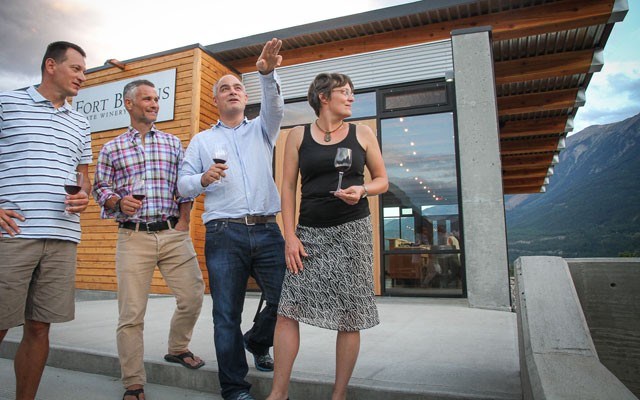On April 1, the B.C. government launched the biggest change in years to how alcohol is sold in the province, but restaurateurs have been left feeling like they're on the wrong end of an April Fool's prank.
For decades, B.C.'s restaurant industry has lobbied officials to be allowed to purchase wine, beer and spirits at government-owned stores at less than retail price, but those pleas appear to have fallen on deaf ears.
Although the province has rolled out a number of recent changes to regulations intended to benefit B.C. restaurants as part of its extensive Liquor Policy Review, Victoria is standing its ground when it comes to wholesale liquor pricing, forcing restaurateurs to continue buying exclusively from British Columbia Liquor Distribution Branch (BCLDB) stores at full retail price.
It's a distressing situation for the resort's restaurant scene — Pique spoke with several local industry veterans both on and off the record who voiced their criticism of the government's stance, including Restaurant Association of Whistler director and La Bocca GM Brenton Smith, although he remains hopeful the province is open to change.
"It's disappointing," he said. "The Restaurant Association of Whistler is surprised, but at the same time there's been some industry pushback, so it looks like there's going to be a long-term lobby."
That pushback hasn't been relegated to Whistler, either, as industry veterans and lobby groups across the province have been vocal in calling for a major overhaul to the current pricing model, which Attorney General Suzanne Anton has claimed will level the retail playing field.
"The government's level playing field also allows them to be the only ones to sell to licensees," Smith added.
Restaurateurs want the option to buy from private liquor retailers at discounted wholesale rates, a move that would cut into the government's retail liquor revenue stream.
"That's an important source of revenue for government," Anton told Business in Vancouver last week. "It always has been, so we're leaving it as is."
The province's refusal to budge on wholesale pricing has also left a sour taste with Rolf de Bruin, co-founding partner of Lillooet's award-winning Fort Berens Estate Winery.
"What we're faced with is government dictating the terms of the relationship we have with our customers — restaurants and liquor stores," he said.
"We are obligated to treat some of our top accounts in Whistler the same way as a customer down in Abbotsford who may buy a case. We're not able to reward loyalty and some of our frequent-buyer customers.
"The industry should be able to find an optimum point where both businesses flourish."
To help government liquor stores compete with the 670 private liquor stores and 12 independent wine retailers in the province, BCLDB stores will be allowed to open on Sundays and holidays and extend their daily operating hours. Some stores will also have fridges installed to store beer and wine.
Victoria is also looking to increase its profit margins with a restructuring of its current mark-up system that will use a formula to determine a new, universal wholesale price for all liquor products. At first glance it appears like the new system is beneficial because the wholesale price still comes in 10- to 40-per-cent lower than current retail prices, but that's before all re-sellers, including government stores, factor their operating costs and profit margins into the final price tag. Anton has estimated the profit margin for BCDLB stores will hover around 16 per cent, below the 17.2-per-cent mark the NDP said is needed to break even, according to the BCLDB's own documents.
De Bruin said this last point could, in a roundabout way, ultimately force the government to reconsider its current retail model.
"If the government finds that the (BCLDB) stores are running at a loss, then the question becomes: Are the taxpayers willing to approve a subsidy for this government channel? Or will there be a renewed call to privatize these liquor stores?" he asked. "I wouldn't be surprised if that's where we're headed. Ultimately putting the (BCLDB) stores in a loss position could be the start of the privatization of those stores, which would then truly create a much more level playing field."
Also of concern for restaurants is that government stores typically don't sell hard-to-find, small-batch liquor brands that private retailers often specialize in.
"Independent wine stores and licensee retail stores actually go out of their way to source products that aren't listed by the BCLDB because they don't have enough volume," Smith said. "As licensees, we aren't able to offer those interesting and unique products to our customers because we're not allowed to purchase them (from private retailers)."
As part of its recent updates to liquor policy, the BCLDB will more strictly enforce a requirement that anyone who is returning of bottle of spoiled wine must do so at the original store it was purchased within 12 months of the sale. For restaurants with an extensive wine list, this restriction seems counterintuitive.
"It's another disappointing change," said Smith. "We have a fairly good cellar program (at La Bocca), and that means I'm pulling bottles that have been cellared for 10 years, so if it's (spoiled), then I'm taking a $300 hit on the wine cost."
For more information on all of the B.C. government's recent changes to liquor policy, visit www.engage.gov.bc.ca/liquorpolicyreview.




